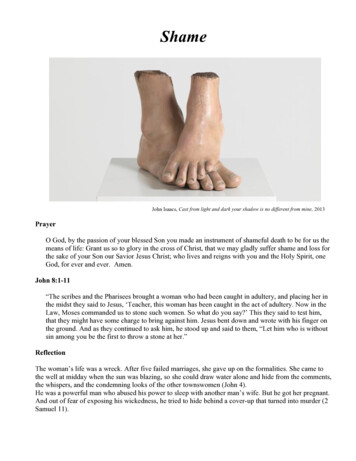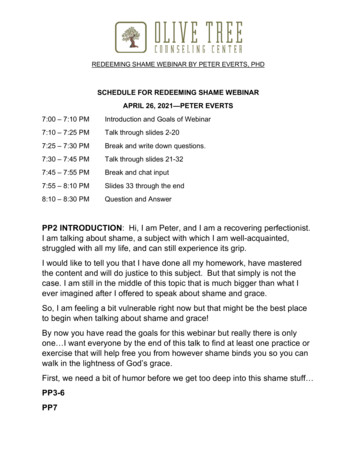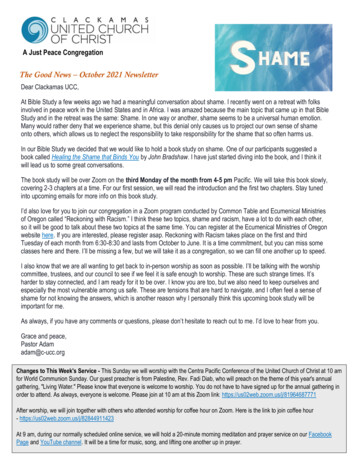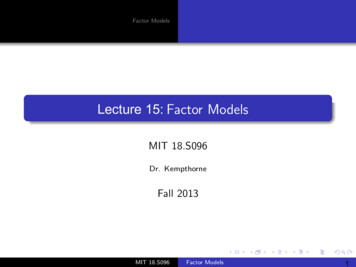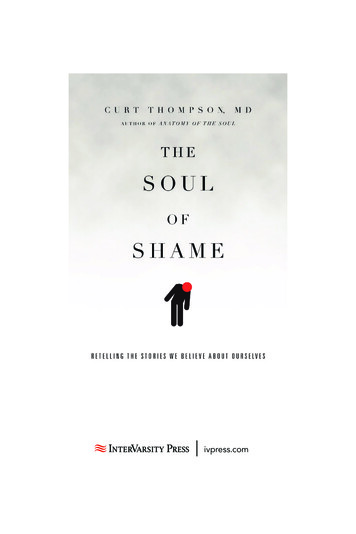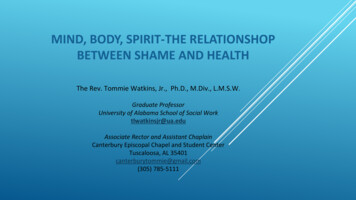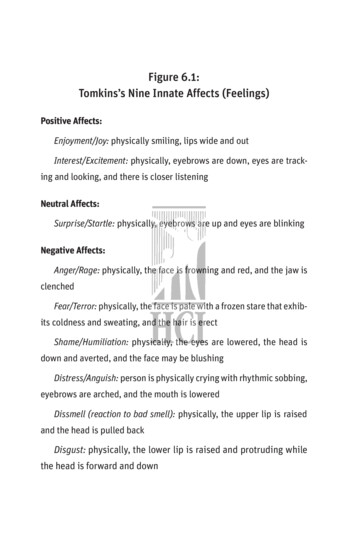
Transcription
THESHAMEFACTORHeal Your Deepest Fearsand Set Yourself FreeSTEPHAN B. POULTER, Ph.D.Shame Factor.indd 34/8/19 2:18 PM
FOREWORDby Dr. William Carter FeltsSelf-image is more important than any other factor in determining direction, success, and overall happiness in life. This“ground zero” influences all of our choices, perspectives, andperceptions.In his seventh book, renowned psychologist Dr. Stephan Poulterexplores the profound emotional experience of shame. No emotionin a man or woman’s life is more confusing, debilitating, and damaging than shame.What is shame? Its insidious nature is complicated and difficultto explain. You can live with all of the symptoms of this debilitatingemotional condition and never want or be able to identify the origin.In The Shame Factor, Dr. Poulter exposes the secret and nonfunctionalnature of this psychological malaise.He carefully dissects the root cause of shame, how it originates,and the many ways in which it can manifest and severely damage ourlives. Understanding the origin and nature of shame is the first stepin bringing awareness and healing to this misunderstood emotion.Beyond simply defining shame, Dr. Poulter provides a road mapto healing using insights, techniques, and exercises that have provensuccessful in many years of clinical practice. Self-acceptance and aperson’s identity can be negatively impacted by the unseen role andharmful nature of shame.In broader terms, the understanding and clarity Dr. Poulter provides can apply to “imposter syndrome,” fear of rejection, and allkinds of insecurity and self-doubt. He shows the emotional and psy17Shame Factor.indd 174/8/19 2:18 PM
18 FOREWORDchological connection between shame and the negative self-imageresponsible for the majority of our suffering.When trying to develop clarity about our “deep inner self,” Ifind it immensely helpful to expand the definition to include livinga shame-free life. The day-to-day integration of psychology and theemotional insight given in this book can aid us in our understandingof self.Dr. Poulter is unique in his credentials and perspective becauseof his additional training in theology and law enforcement. Hisinclusive and comfortable presentation style resembles a personalmeeting with him. Without being overly academic or philosophical,he speaks to you in a manner that is practical, safe, and full of hope.I’m looking forward to the powerful transformation this book willhave in your life.Shame Factor.indd 184/8/19 2:18 PM
ACKNOWLEDGMENTSTo my family, who are powerful loving souls: Miriam, Madison Wendy,Jonathan Brett, Matthew, and Julia.Additionally, I want to thank and extend my hands to those whohave helped me discover, heal, and live a shame-free life. Many ofyou have no idea of the positive impact and lasting impression youmade in my life. Special thanks to my editor, Steven L. Mitchell;Brad Jenkins; Christopher Casey; Erik Odom; Carter Felphs; BarryWeichman; Jim Myerson; Evan C; Dave D; Paramahansa Yogananda; Jay Grossman; Sean Novak; Jack Levy; my late parents, Peterand Charlotte Poulter; Debbie Davis; Peter Chang; the late GraceChang; and to all my clients over the years. Additionally, the following were instrumental in helping form me and this book withinme: Paraiso Way neighborhood, Valley View, Dan Curtis, CoachGoorjian, Coach Goffredo, Paul Roberts, La Crescenta, COTWChurch, CVHS, USC, GPD, Dr. Winston Gooden, Barbara Zax,Lunada Bay Little League Baseball, 11980, and the shame-factorprocess.19Shame Factor.indd 194/8/19 2:18 PM
THE PREFACE OF SHAME:ON A PERSONAL LEVELIt always seems impossible until it is done.—attributed to Nelson MandelaMy journey with shame started early on. I had many personal challenges. I had a speech problem, a terrible timewith learning how to read, and I wore glasses when it was a stigmato have four eyes. When I was around six or seven years old, Iknew something didn’t feel right inside of me. I knew it wasn’tmental illness because I saw plenty of that in my family and relatives. This feeling of terror and despair in my stomach was anall-too-common experience. What was it? I couldn’t describe it; Icould only feel it.My reading problem became a source of personal contentionwith my parents. I was always in the lowest reading group during elementary school. This feeling of inadequacy was my closest and bestfriend. I just couldn’t mentally put things together, and I struggledwith reading out loud in class. I tried so hard, but my mind just didn’tprocess it. I got Ds for reading all through elementary school, whichwas catastrophic for me and impacted how I felt I was viewed by myparents. I am not saying that a lot of other things weren’t happeningat home, but poor reading grades were the bane of my young life.Finally, in the sixth grade, my teacher had me read to her privately.I got my first A in reading. I literally, for the first time, felt I was theluckiest kid in the world as I mastered how to read. Unfortunately,the damage was done. The self-loathing of feeling stupid, defective,23Shame Factor.indd 234/8/19 2:18 PM
24 THE SHAME FACTORand odd was already set in cement. I tried to hide my emotionalmalaise, but it was never far away.Growing up in the 1970s and early 1980s, no one talked aboutanything below the surface of life. There was an emotional gag orderon expressing anything negative or remotely emotional insightful. Ihad figurative gray duct tape around my heart and soul. This continued through childhood and into early adulthood. It wasn’t untilmy second major romantic breakup that I realized I had to do something. My heart felt like it was hemorrhaging emotional pain, andI chronically felt I was “defective” and “not good enough.” WhenI would mention my emotional malaise to my closet buddies, theywould look at me oddly, like my beagle does when I refuse to give hermy dinner. I clearly had a problem that no one else felt or that theyjust didn’t talk about. This realization post-college was even moreupsetting. On paper my life looked fine; I just didn’t feel fine.It wasn’t until my mid-twenties that I finally sought out a therapist. I had to do something because the future didn’t look or feel verypromising. I didn’t tell anyone that I was going to get professionalhelp because none of my friends or family had ever done that before.Putting words to this “dis-ease” and emotional malaise seemedimpossible. I didn’t feel depressed, and not particularly anxious, butI just felt seriously defective. On our first visit, I said to my therapist,“I feel really messed up on the inside. What is it? Because I feel terrible and empty inside?”My mild-mannered psychologist looked at me and said, “Stephan,you are struggling with shame!” Finally, my emotional terrorist wasnamed and exposed. The relief I began to feel over the followingmonths was tremendous.Shame was now formally named. The state of not knowing whatwas wrong with me had been torture in itself. Not allowing shameto control my life has been a bumpy dirt road of a healing processever since.This book, The Shame Factor, is an in-depth exploration into theinsidious unrecognized role shame plays in people’s lives. Smart,Shame Factor.indd 244/8/19 2:18 PM
THE PREFACE OF SHAME—ON A PERSONAL LEVEL 25loving men and women tell me all the time that they don’t have anyshame. The denial, avoidance, and emotional amnesia of trauma isthe perfect setting for shame’s growth and control in our lives. In thisbook, we will discuss childhood, family history, emotional expression, addiction, self-loathing, body image issues, career, money, love,sex, relationships, people pleasing, self-doubt, food concerns, embarrassment, imposter syndrome, and all the other factors of shame.Shame is a very tricky psychological phenomenon, but we willlook at it systematically so you can see how it has affected you anddecide how you want to manage it. I know you have the courage toread this book and continue your journey to living a shame-free life.Let’s start this process.There is nothing in a caterpillar that tells you it’s going to bea butterfly.—R. Buckminster Fuller,“Everything I Know,” 1975Shame Factor.indd 254/8/19 2:18 PM
SECTION IWHAT IS SHAME ANDWHY IS IT A PROBLEM?The possibilities are numerous once we decide to act and notreact.—Gloria Anzaldúa,Borderlands/La Frontera: The New Mestiza, 1987All journeys have secret destinations of which the traveler isunaware.—Martin Buber, The Legend of the Baal-Shem, 1955Until you make the unconscious conscious it will direct your life,and you will call it fate.—attributed to Carl JungShame Factor.indd 274/8/19 2:18 PM
CHAPTER 1THE SHAME FACTOR:WHAT IS IT, DOCTOR?EXPOSING THE BIG SECRETFor reasons rooted in the values of contemporary culture, theconcept of shame had until recently all but vanished from discussions of emotional disarray. Now it is regarded by many psychologists as the preeminent cause of emotional distress in our time.—Dr. Robert Karen, “Shame,”Atlantic Monthly, February 1992It’s like there is a hunter (shame) over your shoulder, and thehunter is always coming. And they’re going to find out that I amflawed and defective. They’re going to find out that I am notwhat I look like I am. My secret will be exposed.—John Bradshaw,Healing the Shame That Binds You, 1988No mental health professional, psychologist, healer, or medicalpractitioner will debate that there are many different psychological and emotional issues, personality disorders, and chronic humanconditions in life. None of these disorders have the deceptively negative influence and residual toxic power of shame—none! Shame is oneof the most universally traumatic emotional states, fraught with irrational beliefs and paralyzing experiences for people of all ages (afterabout the age of five) and races, spanning all economic and educa29Shame Factor.indd 294/8/19 2:18 PM
30 THE SHAME FACTORtional levels. No one is immune or exempt from shame, one of themost highly underrecognized and terribly misunderstood of all humanemotions and states of being. Shame is clearly a taboo topic and israrely discussed in therapy or outside the therapy office. I have beenin practice for a long time (over thirty years) and my clients look at mewith an air of suspicion and mistrust when I ask, “Tell me about therole shame plays in your life?” The typical response is, “What shame?I am not guilty of anything, and I don’t have shame.” That response,and the professional silence on the issue, is why shame is the mostcommon emotional or psychological condition to remain untreated,unhealed, and unexposed. My clients are dramatically more comfortable discussing more familiar topics like anxiety or depression, orverbally bashing their ex-husband or wife. Because of shame’s complexity and insidious nature, it is difficult to discuss or describe. I oftendescribe the physical experience of shame as trying to nail sand to thewall and wondering why you can’t get a handle on it.SHAME IS NOT GUILTGuilt is directly associated with a wrong action or poor behavior thatviolates one’s moral values. Shame is a much different beast. Beforewe define the inner workings of shame, let’s first describe in detailthe raw, dark experience of it. Both writers quoted at the beginningof the chapter are identifying the social, personal, and psychologicalgravity of shame in its role of creating irrational personal beliefs thatseparate us from the people we love—and ultimately from ourselves.Working Definition of ShameFor our discussion purposes, I am defining shame as the following:a primary emotional wound, not a secondary belief, based on a particular action; a paralyzing emotional, mental, psychological state of mindthat distorts a person’s view of themselves in their world and with others,Shame Factor.indd 304/8/19 2:18 PM
THE SHAME FACTOR—WHAT IS IT, DOCTOR? EXPOSING THE BIG SECRET 31preventing them from developing a loving sense of self and impairingthe individual from developing trusting, secure, safe relationships that arebased on mutual respect and understanding; a chronic fear state of beingdiscovered as a phony, a fraud, and an imposter.The person is emotionally incapable of feeling like a valuable andproductive adult, has an underdeveloped inner sense of self, andlacks personal self-acceptance. This is further characterized by anegative inner self-portrait and an unclear perspective of relationships with self and others.This definition is not out of a book or from a particular theorybut from thousands of clients and friends (me included) who havestruggled with this distorted, ugly, and blinding emotional state. Thefar-reaching influence of being ashamed isn’t limited to any particular situation in a person’s life. It is pervasive. Like physical cancer, itbecomes the driving force in all of your decisions: romantic, financial,sexual, health, career, parenting, etc. There is no area of functioning,feeling, and living that isn’t colored or touched by this silent shadow.Shame in psychological theory is frequently referred to as a person’s“shadow” side, part of the unwanted and disowned aspects of theirpersonality.1 Clearly, if you feel ashamed, you don’t want to exposeor explore these aspects of your behavior or emotions. Concealingthese feelings and beliefs from everyone can begin as early as age five.This concealment process is called the false, or public self versus thereal, wounded self.2 Throughout this book we will explore how to reconcile the false self with the true inner self. Exposure and emotionalrewiring (section III) is the pathway to your transformation and innerhealing. If left untreated, shame has the potential to completely andthoroughly take control of any man or woman’s life (a prime exampleis the fact that virtually all addictive behaviors are shame-based).3Real Life Victims of ShameMy client Dave, age fifty-three, is a very successful tract-home developer in the greater Southern California area who struggles withShame Factor.indd 314/8/19 2:18 PM
32 THE SHAME FACTORrandom emotional paralyzing bouts of shame. Regardless of hiscareer accomplishments, Dave feels inadequate and inferior and isoften prone to raging verbal outbursts toward his employees, wife,family, and colleagues. Dave has the reputation of having angermanagement issues. (I personally don’t believe that there is such athing as anger management issues—rather, anger is a symptom ofuntreated shame, as we will discuss.) He recently lost his emotionalcomposure with a home loan officer and was arrested for makingdeath threats to everyone in the bank. Dave recounts this story, alongwith many others, saying, “I suddenly feel this surge of embarrassment, my stomach drops, and I feel this hole inside of me open up,and I can’t stop the rage from coming out. I know I don’t reallybelieve what I am screaming, but it has a life of its own.” Daveexplains that his rage outbursts come and go quickly and do a lotof relationship and emotional damage in his life. He feels incrediblymentally defective, emotionally damaged, and beyond help or repair.When we started to discuss the undercurrent of shame in his career,marriage, childhood, health, friendships, and his relationship withhis children, Dave began to see the different emotional connections,reaction patterns, self-loathing, and chronic negative self-talk playingout in his life constantly. We will discuss Dave’s story, progress, andprognosis further in section II of this book.My client Emily presents a different storyline, but her core issueis the same as Dave’s. Emily is a nineteen-year-old college freshmanat a major local university in Los Angeles, who has been secretlycutting her lower stomach and pelvis area with scissors, razor blades,and thumb tacks since she was twelve years old. Whenever Emilybecomes upset, ashamed, or embarrassed, or when a friend is madat her, she impulsively engages in this self-mutilation. Emily came tosee me because she is frightened that her self-hatred, perfectionism,and false social image is falling apart. In the past, she has been hospitalized for self-destructive behavior, with little or no behavioralchange. During our first therapy session, I asked Emily what she wasso ashamed of or was hiding from. She looked out my office windowShame Factor.indd 324/8/19 2:18 PM
THE SHAME FACTOR—WHAT IS IT, DOCTOR? EXPOSING THE BIG SECRET 33and said, “I have a lot of secrets and no one will believe me. I hatemyself and my life. Yet I don’t want to die. I have good days, thenthis rage boils up in me and I lose my shit and hurt myself.” Emilypaused and listened to the possibility that shame could be an emotional issue she had never considered or understood. She was veryinterested in the idea that her unresolved, untreated shame was aprimary driving emotional force in her life. We will revisit Emily insection II of the book, when we talk about body image and shame.FIVE EMOTIONAL ELEMENTS OF SHAME1. Shame Is the “Emotional Cancer” of Your Heart and SoulThe best way I know how to express the power of shame is to liken it toan emotional cancer of the human heart and mind. We all know what acancer of any type or magnitude can do to the human body by attackinga person’s health and vitality. Shame functions the same way on anemotional and spiritual level. It rebels against the heart and soul of anindividual in the same way that a cancerous tumor attacks the person’sbody. Rebellion of any sort against your healthy sense of self is neveran easy issue to address or to see clearly. Emotional cancer can literallykill you (for example, through a drug overdose) or can sabotage you inits attempt to remain in control. Regardless of its insidious and intrinsicnature, shame is an issue that is treatable, but it must be addressed headon in order to move forward on your life and spiritual path.The lasting legacy of emotional shame is that you feel you aresecretly and privately defective, always hiding that you are not beinggood enough or that there is something “not enough” about you, whichis counterintuitive to your self-acceptance process. The “hunter” inthe John Bradshaw quote is your shame, always terrorizing you andthreatening to emotionally blackmail you into remaining a victim,captive and psychologically repressed. Shame is an awful taskmaster,driving you into complete despair and hopelessness. This reaction isShame Factor.indd 334/8/19 2:18 PM
34 THE SHAME FACTORin direct opposition to having a fulfilling life journey, which is expansive, loving, caring, forgiving, and compassionate. Two entirely directpaths that have two entirely different outcomes for your life. Shameis incompatible with your divine, intuitive, and loving nature. Manyreligious scholars refer to shame as our sinful nature, our fallen self,or simply as evil. Clearly, shame isn’t our highest self or pure nature;it’s the ego’s control at its worst.2. The “Big Secret” of ShameOne of the salient features of being a victim of shame it that it leavesits victim feeling flawed, unlovable, and/or disposable or replaceable. The core belief that you are of no value to the world and theloved ones in your life impairs and sabotages any significant personaldevelopment. Another way to put this is that you have a chronic,deep-seated fear that your coworkers, romantic partner, children,neighbors, and clients will discover that you are a fraud. The naggingvoice in your head keeps telling you that “You really aren’t any good.You are incompetent and incapable of doing or being whom andwhat you pretend to be. Eventually, everyone will find out about yourterrible secret.” This isn’t an occasional emotional state, but ratherthe inner emotional geography of your fragmented sense of self andstalled self-acceptance process. The feelings of shame are chronic,but their emotional intensity can vary from low to extreme.3. Shame Is an Inside Job, Not Something Outside of YouShame isn’t alleviated by selfless actions or loving gestures. Shamedoesn’t decrease with any type of outward behaviors, wealth, education, love, sex, or relationships. Shame is immune to all outwardtreatment or healing actions directed at it via drugs or any othermind-numbing behaviors (i.e., alcoholism, gambling, sex, or anyaddictive behavior). Addictive behaviors can momentarily silenceyour inner shame critic, but never for very long or without leading toShame Factor.indd 344/8/19 2:18 PM
THE SHAME FACTOR—WHAT IS IT, DOCTOR? EXPOSING THE BIG SECRET 35more self-loathing later. Shame can only be addressed, treated, andremoved from your life with an inward approach that involves selfacceptance, self-love, and your newly acquired emotional awareness.4. Chronic Fear of Not Feeling “Good Enough”Shame chronically slices away at a person’s sense of self-acceptance,preventing them from developing any degree of personal autonomyor sense of competence. It also prevents a person from properly developing inner confidence and the belief that their true self is lovable,acceptable, or good enough. How could anyone ever trust or believe inwhat you have to say or do when you are harboring the big unspokensecret that says you’re a fraud (imposter syndrome)? I can’t begin todescribe how many of my clients over the years identify these exactfeelings and yet still argue that it’s their personality that is the problem,and it is their plight in life to feel deficient and like a “phony.” Manyof the shame-driven people that I work with are some of the greatestindividuals I have ever encountered. Unfortunately, they are addictedto their shame belief system like a dog is attached to a bone (my beagleand a bone—inseparable). They don’t let go of the addiction until theemotional trauma caused by the shame cycle blows up their life. Thehuge explosion usually occurs in their relationships, finances, career, orhealth, and can be brought about through the death of a loved one ora family crisis (see section II). It is only at a point of complete despairthat a personal awakening begins to become possible, as the personbecomes aware of the truly deceptive power of shame. Only then willhe consider the possibility of healing and resolving these powerful lifelong self-defeating emotions, beliefs, and actions.5. Shame’s Emotional Super Glue:Addiction Mixed with ShameIt’s my professional and personal experience that the issues surrounding shame are the least understood, least diagnosed, and leastShame Factor.indd 354/8/19 2:18 PM
36 THE SHAME FACTORdiscussed emotional concepts in all the various types of psychological therapy modalities, including twelve-step recovery programs andpeer counseling. The powerful emotional combination of addictionand shame is a force within a person’s life that has to be reconciled;otherwise, the prognosis for healing is bleak. For instance, it is mucheasier to discuss depressive bipolar issues than the intangible powerof self-loathing, self-hatred, and addictive behaviors—which areall motivated by shame. Psychologically speaking, shame is a deepseated belief and feeling that is part and parcel of all maladaptive,self-defeating, and self-destructive behaviors. Shame isn’t an actionrelated feeling or event but rather an ongoing emotional malaise thatrears its ugly head at certain times in a person’s life. It is a paralyzingfeeling and a negative thought process that has no regard for a person’s education, intelligence, wealth, or professional position. Shameknows no boundaries or limits in our lives.As painful as shame is, it does seem to be the guardian of themany secret, unexplored aspects of our being. Repressed shamemust be experienced if we are to . . . come to terms with thegood, the bad and the unique of what we are.—Dr. Robert Karen, “Shame,”Atlantic Monthly, February 1992SHAME FACTOR: THE CLASSIC SYMPTOMSThe following shame severity scale contains some of the more commoncharacteristics of shame-based behaviors and feelings that you mightexperience. Take an honest look at how you feel about yourself, yourrelationships, your romances, your sexual intimacy, authority figures,and your ongoing self-doubts, which are all influenced or fueled byshame-based emotional malaise. Understanding the silent ways shamelives and operates in your daily life is critical to exposing it, healingit, and permanently removing it from your life and spiritual path.Shame Factor.indd 364/8/19 2:18 PM
THE SHAME FACTOR—WHAT IS IT, DOCTOR? EXPOSING THE BIG SECRET 37Nothing about you or your life circumstances is unacceptable, unlovable, or worthless. Nothing! Do not lose that perspective. Shame is alearned behavior that can be changed and healed.Exposure Is Really GoodThe first step on your recovery journey is to honestly examine yourshame-based feelings, actions, and personality patterns up close andfrom a distance. It’s important to mention at this juncture in our discussion that most people are involved with some form of personal growthor self-improvement, such as psychotherapy, mind and body healing, orsupport groups. No one is perfect, and personal growth is the processof healing and of reclaiming the underdeveloped parts of your personality. Developing personal awareness is the deliberate act of acceptingyour shame and making a commitment to healing it. If someone isn’tinclined or interested in personal growth, then they are either livingshame-free or they are avoiding their painful traumatic past.You can think about shame as being experienced on a scale fromzero to ten. A zero would mean living shame-free, and a ten wouldmean being fully consumed and controlled by self-destructive behaviors. Your experience of shame is personal, and it is something onlyyou can diagnosis and treat. Below, we will discuss the shame scaleand the wide range of the experiences of shame. Our life journeyconsists of learning, expanding our self-awareness, and transforming. Shame is a psychological and emotional malaise that canbe left unnoticed and untreated for many years. Most people havesome type of personal challenge, an area that needs improvement,and if shame is a factor, it will impair any positive personal change.Unfortunately, most people stop at the critical point of confronting their “shameful” beliefs on their road to positive self-awareness. Don’t stop, no matter how awful you feel or how scared youare. I assure you that this confrontation is well worth all the effort.The paralyzing fear of revealing your hidden secrets and toxic feelings is absolutely necessary to get past your current shame state.Shame Factor.indd 374/8/19 2:18 PM
38 THE SHAME FACTORIt’s a paradox because the very thing you desire is within you. Youruncomfortable feelings about yourself are the roadblocks to yourimmediate fulfillment and purpose. Acknowledging your shame andits incredible hold on you is a major transformational phase in yourlife. Staring your shame in the face with the limitless power of selflove and acceptance is applying the sun to morning fog. All yourshame-based personal beliefs evaporate and disappear from yourconsciousness and daily life. Be brave and be honest with yourself.You can and will survive your shame exposure process. You don’twant any more days living as an emotional prisoner to your shame.Your Shame Scale and Shame Checklist:What’s My Shame Status?Remember, you aren’t a monster. Shame is only a shadow in yourcloset of secrets. Turn the light on and look within your closet of oldissues, addictions, and secrets. Everyone has a closet that needs to becleaned out and restocked with new items. Before you move on tothe shame checklist, think about rating your feelings of shame fromzero (healed, shame-free) to ten (completely controlled by shame).The following scale will help you focus on where your normal shamelevel is, and how extreme it can become when triggered by certainevents, feelings, or actions. All experiences of shame—whether on adaily, weekly, monthly, or random basis—are generally triggered bya distorted personality belief system concerning feelings, actions, orrelationships (family, social, love, and sexual).Your Shame Scale0. Not your emotional issue.1. You understand the concept but don’t feel shame.2. You occasionally feel shame about certain issues, but thefeelings quickly dissipate.Shame Factor.indd 384/8/19 2:18 PM
THE SHAME FACTOR—WHAT IS IT, DOCTOR? EXPOSING THE BIG SECRET 393. You notice that certain events or experiences trigger a waveof shame, but those feelings don’t last.4. Sometimes you are scared to reveal the truth about yourselfor a personal feeling.5. You experience bouts of shame-based reactions and embarrassment. You feel enraged and like a fraud at work or withfriends, and you are fearful of being exposed.6. You have many days or moments when you feel exposed,enraged, and emotionally panicked about being discoveredas a fraud or reprimanded for something.7. It is difficult not to immediately escalate when you are beingaccused or questioned about a problem. You feel exposedand fearful. You react with intense anger; calming downafter being triggered is very difficult.8. You are told by people that you have an anger managementproblem. You engage in physical and heated verbal altercations as a means to protect your inner feelings. You areaggressive toward others when feeling shamed.9. Your relationships are influenced and shaped by your powerful negative feelings, beliefs, and self-defeating shamedriven actions. Your life is controlled by your shamereactions. You struggle with addiction and thoughts of deathor suicide. You cannot tolerate any conflict without extremeinappropriate reactions.10. Your life is consumed with shame-based addictions andbehaviors. You are incapable of functioning at your potential. You consider death as an escape plan or murder as anoption. You are a danger to yourself and others, and you areresistant to seeking any type of assistance. These extremereactions may be a result of severe drug abuse. Professionalmental or medic
Healing the Shame That Binds You, 1988 N o mental health professional, psychologist, healer, or medical practitioner will debate that there are many different psycho-logical and emotional issues, personality disorders, and chronic human conditions in
